Thousands left homeless as Moria camp on Greek island of Lesbos destroyed in fire
A MASSIVE fire has destroyed most of Moria camp on Lesbos, forcing thousands of refugees to sleep on the streets without shelter, water or food.
Greek authorities imposed a state of emergency following a meeting this morning and approved plans to evacuate around 400 unaccompanied children to the mainland.
Reports suggest that the fire was caused by a number of smaller blazes around the perimeter of Europe’s largest refugee camp which rapidly spread due to strong winds.
Thousands fleeing the fire were prevented from reaching Lesbos’s main city of Mytilini by riot police.
Workers from non-govermment organisations (NGOs) told the Morning Star that police had initially prevented volunteers from giving water, food and blankets to the stranded refugees.
“It’s absolutely terrifying what’s going on right now,” said Refocus Media Labs co-founder Douglas Herman. “[The police] are not allowing NGOs to provide blankets or food or water or anything.
“We don’t know if they’re going to transport these people to the football stadium here, to the port, but they can’t go back into this place that’s been destroyed.”
Local NGO Stand by Me Lesbos claimed that some locals attacked refugees and tried to stop them from passing through a nearby village.
The cause of the fire has not yet been confirmed, however one of the blazes is said to have started after a group of refugees confronted police at the camp’s Covid-19 quarantine area.
The group allegedly believed that the Greek authorities had been lying about positive cases of Covid-19 in the camp in order to impose further restrictions.
Officers are said to have fired tear gas at the group who responded by lighting a fire to mitigate the effects of the gas.
Moria was put into total lockdown last week after authorities recorded the first positive cases of Covid-19. There have since been 35 confirmed cases.
A few days later Greece’s Minister of Migration confirmed plans to turn Moria into a closed controlled camp, signing a contract with a construction firm to start preparatory work.
It follows six months of partial lockdown at the camp, with restrictions continually extended since April, despite Covid-19 measures being lifted across the rest of the country.
Mr Hurman said that refugees trapped in Moria had been “absolutely fed up” with the situation.
At midday on Wednesday NGOs were still blocked from giving aid despite temperatures soaring to 30 degrees, while three special units of riot police landed on the island from Athens.
Legal Centre Lesvos said that the government’s immediate dispatch of security forces before offering aid "continues their policy of framing migrants as a question of public order and prioritising their securitisation as opposed to the provision of urgent assistance."
“This fire is a visceral manifestation of European policies, which have for years tolerated the containment of migrants in dangerous, overcrowded and insecure conditions,” said Amelia Cooper of the legal NGO group.
“Residents of Moria camp, and migrants in hotspots across Europe, are in situations of manufactured and state-sanctioned vulnerability. This fire was not an accident, it was an inevitability.”
September 9, 2020
JOANNA KAKISSIS

Children walk through the Moria migrant camp on the Greek island of Lesbos after the camp was gutted by fire.Angelos Tzortzinis/AFP via Getty Images
Several swift fires gutted Europe's largest refugee camp on the Greek island of Lesbos, sending 12,000 asylum-seekers scrambling for emergency shelter.
The camp, named Moria, after a nearby village tucked into olive groves, was already notorious because of its horrific conditions, which included severe overcrowding, poor sanitation and lack of soap and water taps. Asylum-seekers at the camp often lined up for hours for food that was often spoiled.
A state of emergency has been declared on the island. No deaths have been attributed to the fire but some people experienced breathing problems because of smoke inhalation.
It's unclear what sparked the fires but Migration Minister Notis Mitarachi told reporters that they "began with asylum seekers" after at least 35 COVID-19 cases were confirmed at the camp. He said some asylum-seekers who tested positive for the virus did not want to be quarantined.
In a televised address, Prime Minister Kyriakos Mitsotakis said that he understands the "difficult conditions" at the camp but that there's no excuse "for the violent reactions to strict health protocols and checks due to COVID."
Asylum-seekers who fled Moria camp told NPR that while there was some resistance to quarantine, "we would not set fire to our own homes," said Omid Alizadah, a 30-year-old pharmacist from Afghanistan who lived in a tent with his wife and four-year-old son. "We would not endanger our own lives and the lives of our children."
Alizadah leads the Moria Corona Awareness Team, a refugee-led group that educates camp residents about how to best protect against COVID-19. He and his family pitched their tent in an overflow area at an olive grove next to the camp, which was designed for fewer than 3,000 people but now holds more than 12,000.
The family fled as soon as the first fires broke out on Tuesday night and didn't returned because police blocked off access. A neighbor told him that his tent was largely spared. He's now sheltering with relatives.
"I would like to think that the Greek government will put us somewhere human after this, but I don't know," he said. "If the only option for me is to go back to a tent surrounded by burnt trees, I will go. I don't have a choice."
Amelia Cooper of the Lesbos Legal Center, which assists refugees with asylum issues, told NPR that many of the center's clients — including several unaccompanied minors — ended up spending the night outside — along the road or in a nearby forest. She said they had no access to food, water or hygiene facilities.
"There's also lack of information about the response, about what comes next," she said. "The overwhelming sentiment that has been shared with us is that this was inevitable, that the residents are subjected to a slow death every day, and that this fire was far from a surprise."
Ra'ed Alabed, a 45-year-old Syrian, is now sheltering with friends along with his daughter, son-in-law and four-month-old granddaughter. The fires destroyed their tents.
"We don't know what will happen to us," Alabed said. "We are hoping that the European people will show some humanity and help us. We are not animals."
Alabed runs the Moria White Helmets, a group of independent volunteers in the camp that specialize in safety issues. He helped his neighbors escape during the fire.
Cooper of the Lesbos Legal Center said Moria camp did not have a fire evacuation plan.
European Commission President Ursula von der Leyen tweeted that she is "deeply sorrowed" by the fires at the refugee camp and is sending a vice president, Margaritis Schinas, to Greece as soon as possible.
Meanwhile, EU Home Affairs Commissioner Ylva Johansson says Brussels will pay for the transfer of 400 unaccompanied minors to shelter in mainland Greece. EU member-states have agreed to eventually take in those minors. Johansson says the EU will also pay for a ship to house refugees displaced by the fire.
Moria camp has been the European Union's main refugee camp since 2015, when more than 850,000 asylum-seekers — most of them from Syria, Iraq and Afghanistan — crossed the sea from Turkey to the Greek islands in the Aegean Sea. Some 300,000 have arrived even after EU borders closed and Brussels partnered with Turkey to keep migrants from crossing. As the EU closed its doors to migrants, those who crossed got stuck in camps like Moria, which sometimes held more than 21,000 people — more than seven times its capacity.
"There is no place in the world worse than Moria camp," says Omid Alizadah, the Afghan pharmacist who fled the camp during the fire. "It is the worst place I have seen in my entire life. Anyone who comes out alive from Moria camp is a hero."
Fire 'destroys' Europe's largest migrant camp on Lesbos
By Elinda Labropoulou, Chris Liakos, Stephanie Halasz and Tamara Qiblawi, CNN
September 9, 2020
Athens, Greece (CNN)Europe's largest migrant camp, Moria, has been "completely destroyed" after massive fires broke out early Wednesday at the overcrowded site on Greece's Lesbos island, according to an eyewitness.
Firefighters are trying to contain the fire at the refugee camp, home to an estimated 13,000 people, more than six times its maximum capacity of 2,200 people. More than 4,000 children, including 407 unaccompanied minors, live in the camp, according to the United Nations Refugee Agency.
There are no reports of injuries so far, and authorities have said they are still assessing the scope of the damage. George Moutafis, a photographer on the ground, told Greek TV channel Mega that the camp has been "completely destroyed."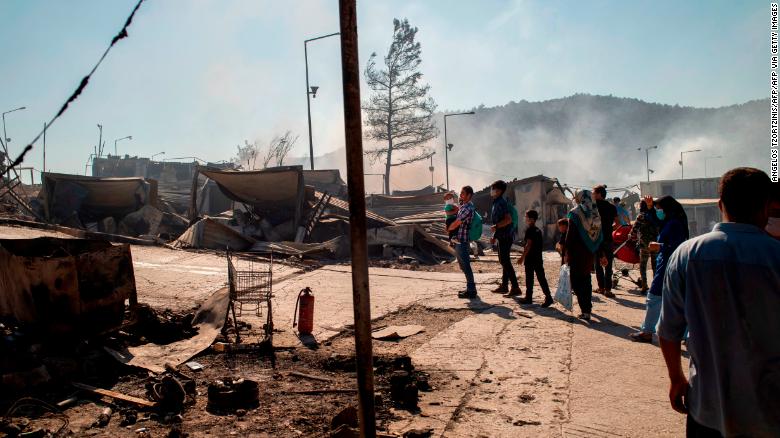
Migrants walk in the burnt camp of Moria on the island of Lesbos on Wednesday after a major fire broke out.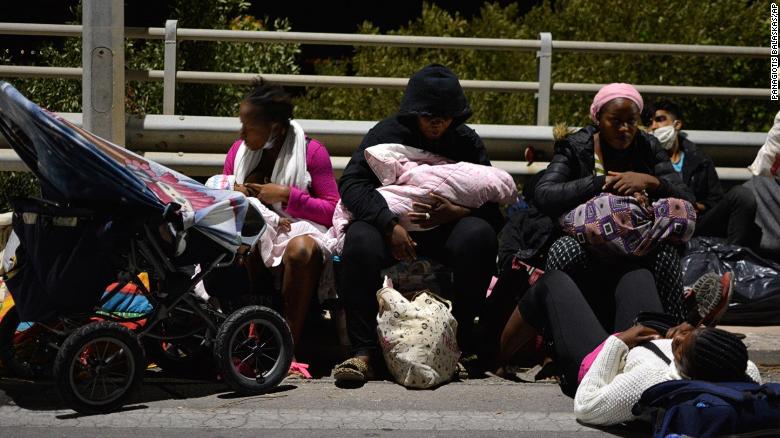
Refugees and migrants with their children gather on a bridge on Wednesday after the fire at the Moria refugee camp.
"The Moria camp no longer exists. The camp has been completely destroyed. The containers and tents have been completely destroyed. The fires are now out. Many migrants and refugees are now back at the camp and looking for their belongings," Moutafis said. Charity and activist groups on the ground also say that the fire has destroyed large swathes of the camp.
The cause of the fire remains unknown, according to Greek authorities. The camp is under lockdown after 35 people tested positive for Covid-19 earlier this week. Local media suggested the fires may have been started deliberately.
Migrants on the ground also report that the fires were started by refugee protesters when a demonstration erupted over lockdown measures.
"Last night some people living in the camp were angry about the quarantine. They started a small fire. So police came and there was tear gas. And then the fire grew and we had to run," said a camp resident, who declined to disclose his full name for security reasons.
"All the camp is burned. There is nothing there. I am standing out on the street, near the camp, there are many people here. There is also police but they don't tell us where to go," said the resident. "We have no food or water. They say 'wait here.' It is very hot today and there are women and babies."
Congolese camp resident Paul Kadima Muzangueno told CNN that a group of minors "started the fire."
"They started fires everywhere," said Muzangueno. "Everything deteriorated quickly. The police did not contain the situation."
Greek Prime Minister Kyriakos Mitsotakis has held an emergency meeting over the fires. In an interview with the state public broadcaster, Government Spokesman Stelio Petsas said a state of emergency was being declared on the island and that Moria's inhabitants would be banned from leaving the island over coronavirus concerns.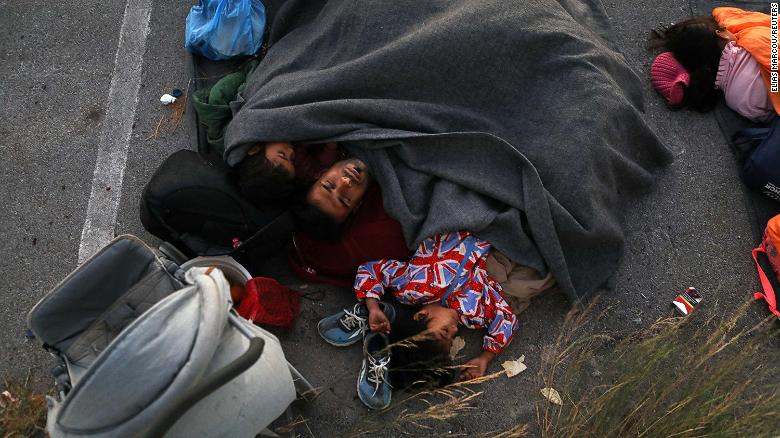
A family sleeps at a parking space, following the fire at the Moria camp.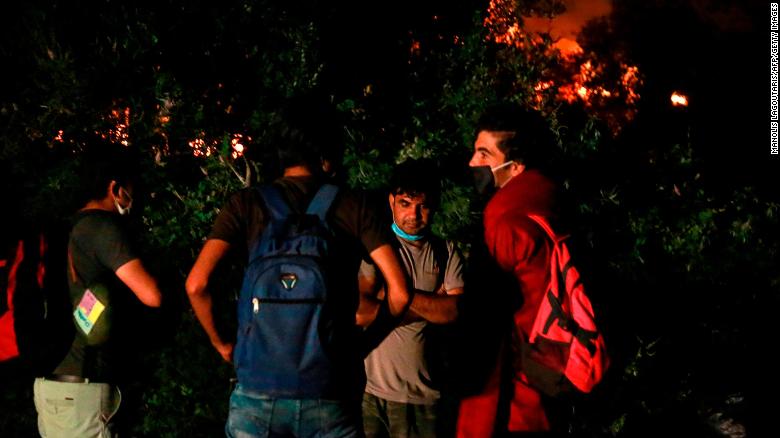
Migrants stand outside the Moria camp on the island of Lesbos as a major fire ravages the site.
Petsias said reports of arson and other potential causes were being investigated.
"In the evening, the anger and despair of the refugees who have been interned at Moria erupted," the German charity group Mission Lifeline said in a statement.
"First there was a dispute at the Covid19 station in the camp which spread to the entire area during the night. Security forces used tear gas," the statement said. "A large part of the dwellings burned down. The homeless people fled into the surrounding olive groves."
Axel Steier, Co-founder of Mission Life, said he warned that the situation would "escalate" over the camp's poor conditions, calling the lockdown measures "the final straw."
"The people in Moria are exposed to extreme psychological stress. The lockdown of the camp has now been the final straw," said Steier. "The refugees in Moria are not treated as humans.
"Among other things, we asked the (German) federal government again and again to evacuate all people from the Greek camps. But hardly anything has happened," Steier added.
The Moria encampment extends out of the main UN camp into olive groves where thousands live in makeshift wooden huts they built out of wooden pellets and tarpaulin, hammered down with nails. The inhabitants say they wait for hours to use a bathroom, and sometimes spend an entire day queuing for food.
When CNN reported from the camp in March, a rank odor filled the air, the river was strewn in garbage and camp dwellers staged protests at the island's main port on a nearly daily basis demanding transport to the Greek mainland.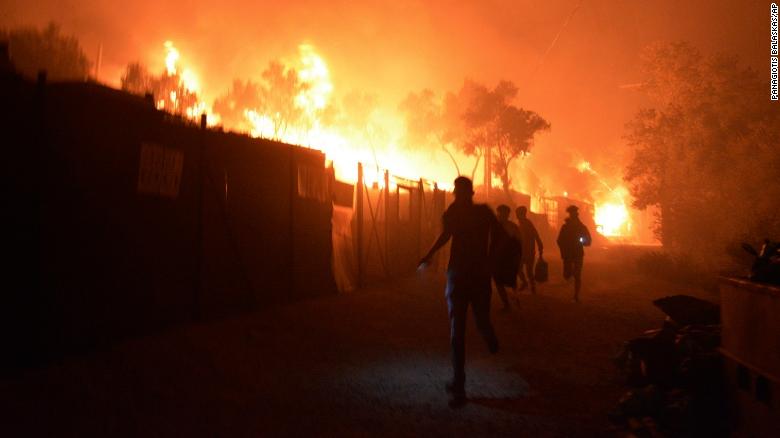
A German charity group at the scene said a protest had earlier erupted at the camp over lockdown measures.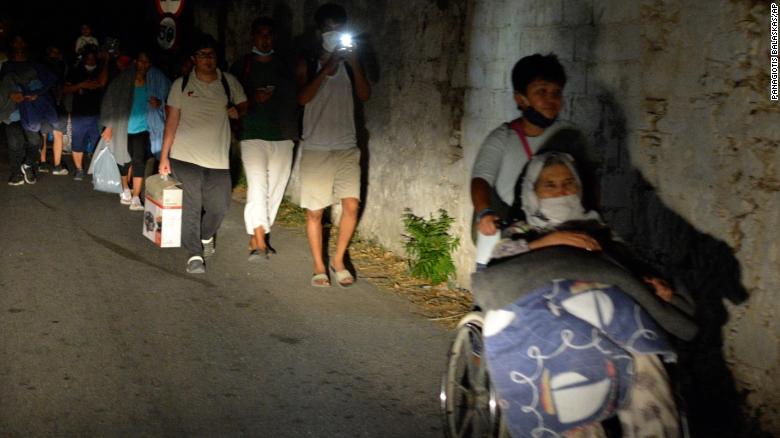
Refugees and migrants leave as a fire burns at the Moria refugee camp.
On Wednesday, migrant residents of Moria described being in a state of limbo, waiting for instructions from authorities among their charred belongings. "We have been told nothing. No one has shown up," said Muzangueno. "We are here and we are waiting."
In a statement Wednesday, the United Nations refugee agency says they have deployed staff to the ground and offered assistance to Greek authorities.
"UNHCR, the UN Refugee Agency, deplores the fire that largely destroyed Moria's Registration and Identification Center (RIC) last night and thanks to the local authorities, including the fire department and emergency services that helped to contain the fire and assisted the people," the statement said.
German Foreign Minister Heiko Maas has called the fire that ravaged Moria a "humanitarian catastrophe."
"What is happening in Moria is a humanitarian catastrophe," tweeted Maas. "As quickly as possible, we have to clarify with the EU commission and other EU countries willing to help, how we can support Greece. This includes the distribution of those fleeing amongst those in the EU willing to accept them."
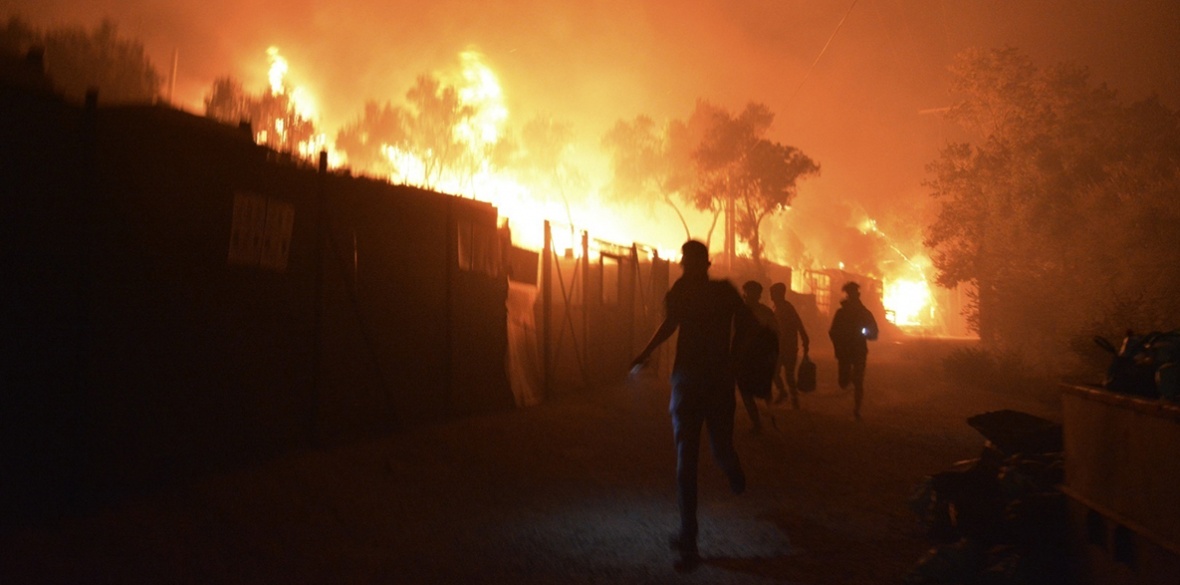
No comments:
Post a Comment